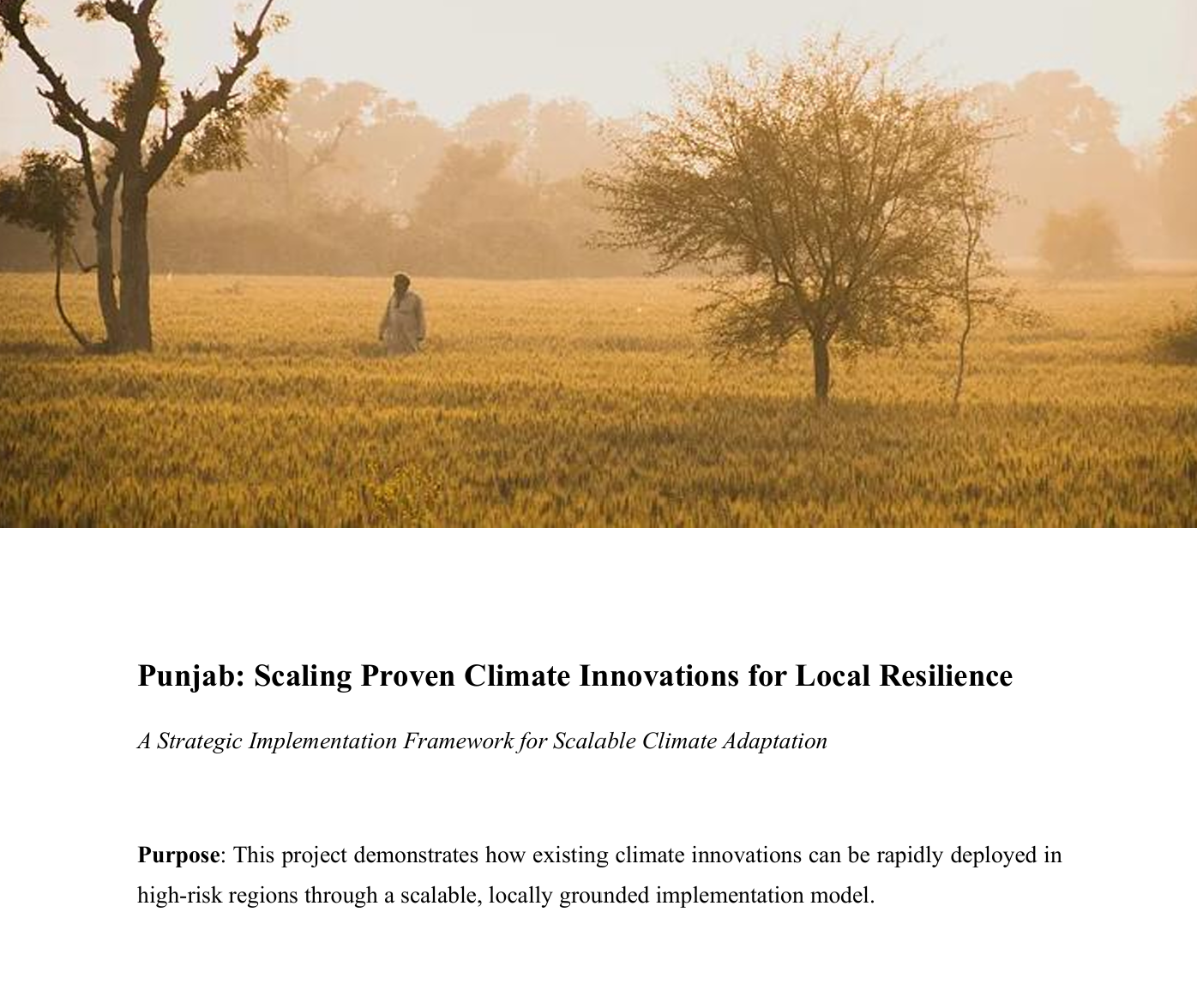
Punjab: Scaling Proven Climate Innovations for Local Resilience
May 2025
Project Type: Climate Adaptation Framework & Local Implementation Strategy
Focus Areas: Micro-Level Innovation, Climate Resilience, Rural Development, Circular Economy, Scalable Infrastructure
Read it here: “Punjab Scaling Proven Climate Innovations for Local Resilience - Manreet Sohi.pdf”
Overview:
This case study proposes a scalable climate adaptation framework for Punjab, a frontline agricultural region in India grappling with escalating climate risks, including water scarcity, air pollution, and ecosystem degradation. While micro-level climate innovations exist globally, their fragmented deployment has left high-risk communities like Punjab underserved.
The project outlines a model to bridge proven green technologies, such as permeable paving, recycled plastic bricks, fog nets, and low-tech irrigation systems, with local implementation in Punjab. By leveraging existing infrastructure, labor markets, and political mobilization, the strategy emphasizes rapid deployment over reinvention. Policy pathways focus on integrating grassroots economic development with environmental restoration through locally grounded procurement, climate employment programs, and public-private coordination.
🚨Key Climate / Economic Challenges
Fragmented climate solutions: Proven innovations like fog nets, recycled bricks, and reflective roofing exist globally but lack coordinated deployment in high-need areas.
Rural vulnerability: Punjab’s farming communities face worsening water scarcity, soil degradation, extreme heat, and farmer debt crises.
Urban environmental stress: Unpaved roads, plastic waste, and failing drainage systems contribute to chronic air pollution and flood risk.
Underutilized local capacity: High unemployment persists despite an available labor force and active brickmaking and construction sectors.
Disconnect between tech and community: Climate funding often targets invention, not implementation, leaving powerful tools unused at the local level.
🌱 Proposed Micro-Level Solutions
Permeable paving with hybrid bricks: Reduce urban dust and flooding using local kiln-sourced bricks, upgraded with recycled plastic.
Community fog net installations: Capture water from air in arid regions to supplement irrigation and household supply.
Low-tech irrigation systems: Affordable gravity-fed or drip systems to combat water stress and increase crop resilience.
Plastic waste repurposing hubs: Establish village-based facilities to process and convert plastic into building materials.
Green public works programs: Fund infrastructure upgrades (paths, schools, drains) using local labor and sustainable materials.
🧑🌾 Proposed Macro-Level Strategies
Climate employment pipeline: Link green innovation rollouts with job creation for low- and semi-skilled rural workers.
Localized procurement models: Fund public works projects that source materials and labor directly from within communities.
Policy integration for circular economy: Position Punjab as a rural testbed for plastic circularity and low-carbon construction.
Replication-ready framework: Build a model in Punjab that can scale to other Global South regions with similar vulnerabilities.
Grassroots-led climate governance: Leverage Punjab’s political awareness and organizing capacity to implement bottom-up, community-first adaptation strategies.
Anticipated Impact: By aligning proven micro-level climate solutions with macro-level policy frameworks, this project aims to create a replicable model of rural climate resilience. In Punjab, the integration of local labor, recycled materials, and decentralized technologies is expected to reduce air pollution, boost green employment, improve water management, and restore ecological balance. Over time, the model could be adapted and scaled across other vulnerable agrarian regions, accelerating climate adaptation while strengthening local economies from the ground up.
End Goal: Proposes a hybrid strategy combining micro-level implementation and macro-level planning to deliver both immediate relief and long-term climate resilience in Punjab.
